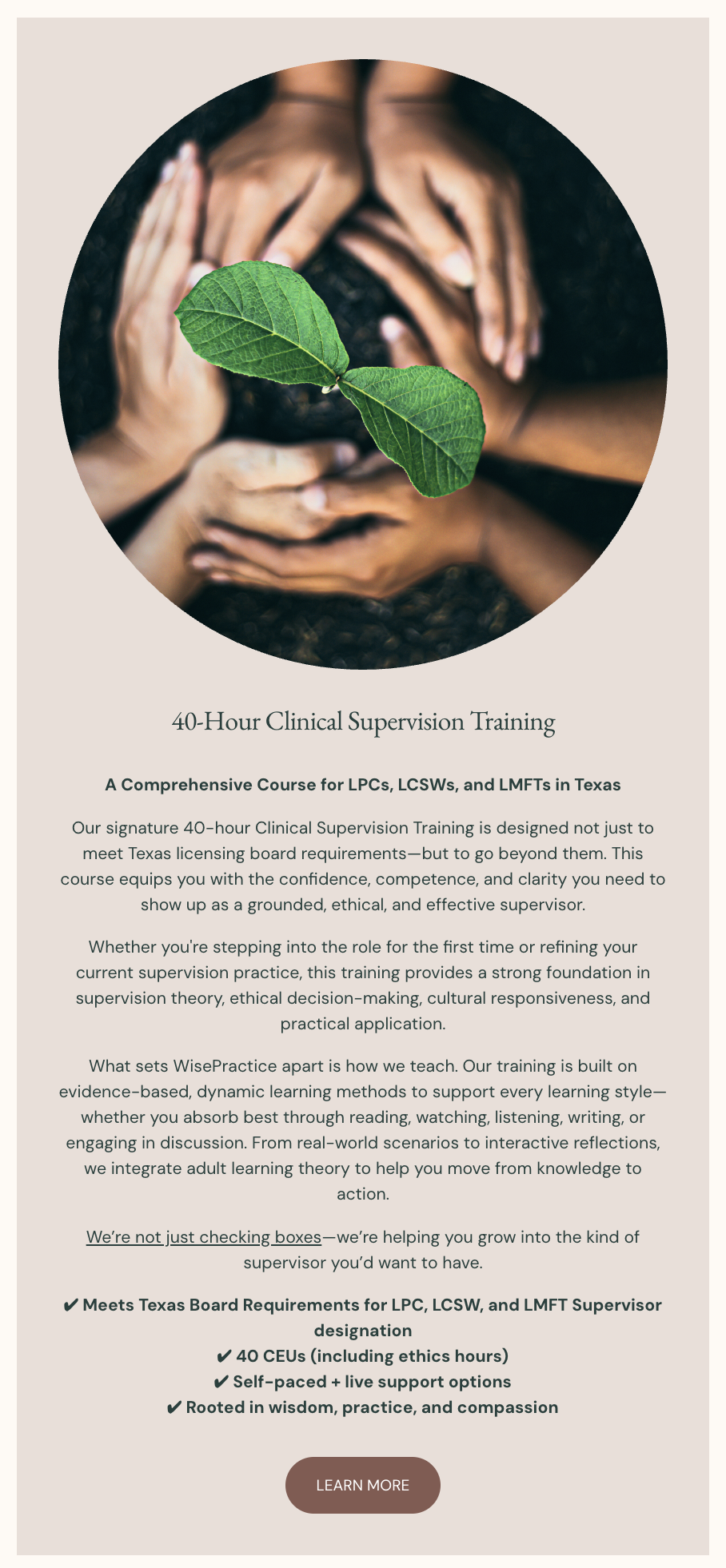Changes in Texas Social Work Rules: What LCSWs & Supervisors Need to Know
June 13, 2025 Social Work Board Meeting Recap
By DeLinda Spain, LCSW-S
If you’re a LCSW or LCSW-Supervisor in Texas - or plan to become one - major updates are on the horizon. At the most recent Social Work Board meeting, the board discussed and adopted key updates affecting continuing education requirements, interdisciplinary collaboration, and the definition and delivery of clinical supervision. As an educator and advocate for ethical, effective supervision, I’m here to break down what these changes mean for our practice and for the future of our profession.
Continuing Education “Cultural Diversity” Language Update
The board unanimously approved changes pertaining to §781.501, continuing education requirements. Specifically, the language referencing “cultural diversity” will be updated to “distinct populations competency.” Board members acknowledged the significant public feedback on this change and clarified that the shift is intended to promote more inclusive and flexible language. The goal is to emphasize a practitioner’s ethical responsibility to identify the populations they serve and to seek out continuing education that supports competence in those specific areas. Board members noted all of the other three boards under BHEC (LPC, LMFT, and Psychologists) approved this same change.
All board members present - including those participating virtually - voted in favor of the amendment. Next, the proposed change will go before BHEC for a vote on June 24. If approved, it will proceed to the Texas Register for final adoption. (See the flow chart below for an overview of the rule adoption process.)
Rule Harmonization: Working Across Mental Health Professions
The board also unanimously approved §781.303, a harmonization rule to standardize expectations when a client is receiving services across multiple disciplines (e.g., from a social worker and a counselor). Previously, each profession had slightly different language about whether coordination was required. The newly proposed language ensures that:
If a client is also working with another licensed mental health professional, you must obtain consent and attempt to coordinate care.
This rule reinforces the shared ethical responsibility of collaborative treatment, reducing confusion and increasing client safety across professions.
Public comment from the quadrennial rule review process significantly influenced this proposal - proof that professional feedback matters.
Proposed Overhaul of Supervision Rules: Clarity, Responsibility, and Transparency
Perhaps the most impactful part of the meeting was the introduction of a package of proposed rules (Sections 401 - 407) that reshape how supervision is defined, regulated, and practiced.
Here are the key changes that are being proposed:
1. Accountability in Supervision
If a supervisee has a complaint filed against them, they are now required to disclose this to their supervisor.
Why? Because supervisors can be held liable for the conduct of their supervisees. This change enhances transparency and gives supervisors the opportunity to intervene appropriately.
2. Remediation Plans Must Travel
If a supervisor identifies deficits and creates a remediation plan, and the supervisee later changes supervisors, that plan must be shared with the new supervisor.
The new supervisor is not required to adopt it but must be aware of it.
Why? This helps ensure continuity of oversight and reduces the risk of supervisees avoiding accountability by simply changing supervisors.
3. Reorganized and Clarified Supervision Rules
The new structure of §§401 - 407 breaks down supervision-related standards into clearly defined categories:
§401 – Licensure Requirements: What’s needed for licensure
§402 – Supervisor Recognition: What do you need to be recognized as a supervisor?
§403 – Types of Supervision: Distinguishes clinical supervision, LCSW supervision, and supervision for independent practice recognition (IPR).
§404 – Supervision Process: Sets expectations for conduct, documentation, and oversight.
Supervision documentation - Supervisors will need to keep the following on file:
Log of Supervision kept by the supervisor.
Date and Duration of each supervision session.
Documentation of non clinical and clinical hours reported by the supervisee, Supervisors do not need to “verify.”
Documentation of agency approval: If a LMSW is working at an agency and receiving supervision from an external Supervisor, that Supervisor needs to keep a copy of the agency’s approval on file. This is to help clarify that the Supervisor doesn’t take on liability for the agency’s clients and to demonstrate that the agency employing the LMSW is aware of the supervisory relationship.
§405 – Clinical Supervision for LCSW Licensure: Standards specifically for guiding LCSW candidates.
§406 – Supervision for Independent Practice Recognition (IPR): What’s required for supervisees pursuing IPR status.
§407 – Independent Practice Definition: Clarifies what qualifies as independent practice in Texas and would define independent practice and simplify the language to “Independent Contractor,” in alignment with the IRS and Texas Workforce Commission.
Why This Matters for Supervisors
These changes aren’t just administrative. They fundamentally shift how we’re expected to:
Protect clients
Support supervisees
Maintain ethical and legal compliance
It’s a clear move toward greater responsibility and structure, which can ultimately improve client care and professional development. These adopted changes also align with updates made by other BHEC boards, reflecting a continued effort to promote consistency licensed mental health professions in Texas.
Final Thoughts
Supervision is more than checking boxes; it’s an active, ethically rooted, and legally significant relationship. These proposed changes strengthen the framework for that relationship. As educators and supervisors, we should stay informed, update our practices, and mentor with intention.
Stay tuned for formal adoption of these changes, and make sure to update your supervision policies and documentation when they go into effect.
How You Can Engage — Stay Informed. Stay Empowered.
Submit written public comment for proposed rule changes (usually due by 5 pm CST the day prior to the meeting) to the board for any issue affecting your professional practice.
Wanting more support as a Supervisor? Join our Supervision Consultation Group!
Stay tuned to WisePractice’s Blog, Collective Wisdom — Subscribe to our newsletter for expert insights, ethical guidance, and real-time updates on policies that shape our profession.



